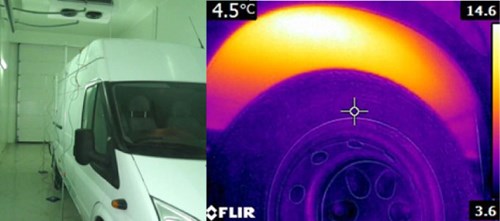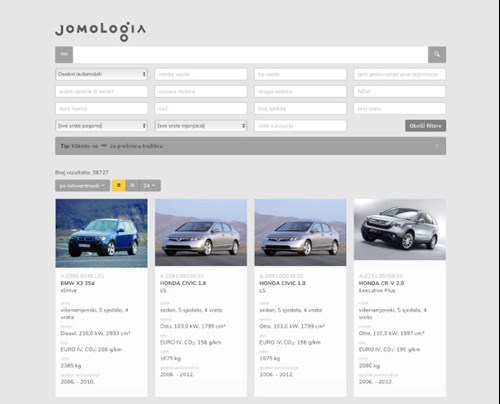Vehicle Testing
Vehicle testing is carried out for vehicles produced individually or in small series, for vehicles which are to be modified or remodelled, for vehicles for which technical data is unknown, and for assemblies intended for installation that are essential for the safety and environmental compatibility of vehicles in traffic.
Features, parts and devices are thoroughly tested in accordance with regulations and standards, and the procedure includes recording of technical characteristics of the vehicle, individual assemblies and devices, review of the relevant documentation, expert processing of results, rating and issuance of a vehicle test certificate. As regards the testing of conversions on serially produced vehicles, a vehicle may not become less safe or less environmentally friendly compared to a serially produced vehicle.
Determination of Vehicle Conformity in the Republic of Croatia (Homologation)
Serially produced motor and trailer vehicles have to be homologated (type approved) and have to undergo a homologation verification procedure before they are placed on the market and registered for the first time. Compliance with the defined requirements is demonstrated by a declaration/certificate of conformity which is a precondition for placement on the market and first registration of a vehicle.
The National Metrology Institute is responsible for determining conformity, while CVH and the Croatian Auto Club are responsible for performing certain tasks in the procedure, in accordance with the applicable rules and regulations on conformity identification.
Determination of vehicle conformity is carried out for all categories of new or used vehicles prior to their entry, import or sale, as well as prior to their first registration in the Republic of Croatia. Road, motor and trailer vehicles, tractors and tractor trailers of M-, N-, O-, L-, T- and R-categories are subject to conformity determination requirement.
CVH collects and processes data within its own unique program database, and the collected data are used for technical inspection of vehicles in all stations in the Republic of Croatia
ADR Agreement

According to the European Agreement on the International Carriage of Dangerous Goods by Road (ADR), the obligation to certify vehicles for the carriage of dangerous goods refers to tanker vehicles, vehicles for the transport and production of explosives, as well as to motor vehicles used to tow such vehicles. The said vehicles should be subjected to testing on the basis of which a Certificate of Vehicle Testing and Compliance for the Carriage of Certain Dangerous Substances is issued, with a view to protecting humans, goods and environment.
The first approval of such vehicles is carried out by CVH. After the initial inspection, their compliance with ADR regulations and national and safety regulations, such as braking, lighting equipment, etc., is demonstrated through regular annual inspections. The said certificates are issued only for N- and O-category vehicles which fully comply with those requirements.
ATP Agreement

In accordance with the Agreement on the International Carriage of Perishable Foodstuffs and on the Special Equipment to be Used for such Carriage (ATP), compliance with the standards of the equipment for the carriage of perishable foodstuffs is verified.
Measurements are performed exclusively in an isolated test chamber at the Kolodvorska bb site in Ozalj, by defined methods for measuring the total heat transfer coefficient K and by procedures for determining and checking the efficiency of thermal devices. CVH has been conducting tests under the ATP Agreement since 2014 by using the measuring and control system.

CEMT Vehicles
As an authorised professional company, CVH carries out partial vehicle testing based on which it issues the specified Certificate of Vehicle Compliance for Participation in International Freight Transport, required with the valid CEMT permit.
Vehicle Value Appraisal and Catalogue of Vehicle Prices, Values and Technical Data
Specially trained appraisers from CVH carry out an additional service of vehicle value appraisal, which is standardised and uniform in all of our technical inspection stations.
In addition to expertise and experience of the appraisers, we use vehicle values from the unique database catalogue and a wide range of specialised and calibrated vehicle inspection equipment as the basis for determining the value of a vehicle.
The catalogue of vehicles' orientation prices, values and technical data is a unique electronic database with technical data on vehicles officially sold in Croatia, with indicated purchase prices.
Using a continuous research of the used vehicle market in Croatia and internally developed algorithms, the catalogue determines the values of used vehicles, with correction related to the mileage and accessories. The values are determined by objective and professional criteria that observe the law of markets and the profession.
Its quality has been recognised by numerous insurance companies, banks, leasing companies, court experts, appraisers, companies that sell new and used vehicles, freight forwarders, vehicle inspection stations, and certain state institutions. The catalogue of vehicle technical data is available to the general public without any additional fee, on jomologia.hr website, whereas access to prices, values and other options is charged through subscription or individual inquiry.
Catalogue of vehicle prices, values and technical data is available at www.jomologia.hr.

Membership and Cooperation with Institutions and Organisations, Social Responsibility and Stipo Lozić-Baškarad Foundation
Since 1996, CVH has participated in working groups of competent national authorities and has worked on drafting regulations in its area of business. Furthermore, it has participated in the work of technical committees of public institutions on the preparation of national, European and international standards. It is a full member of CITA, a Brussels-based global professional association of organisations conducting technical inspections of vehicles. It cooperates and exchanges experience with renowned organisations such as Bilprövningen from Sweden, TÜV from Germany and many others.
It is also a member of laboratory associations HMD (the Croatian Metrology Society) and CROLAB (Croatian Laboratories), and it actively cooperates with the faculties of the University of Zagreb and is a member of the Croatian Academy of Technical Sciences.
Based on the obtained authorisations, CVH systematically follows the work of the UNECE Inland Transport Committee in Geneva in two working groups:
– the working group for the carriage of dangerous goods (ADR)
– the working group for the carriage of perishable foodstuffs (ATP).

Corporate social responsibility represents one of the key elements laying the basis for the work of CVH.
It demonstrates its corporate social engagement through transparent action, directing its attention to employee training, technological development, and in particular to traffic safety and environmental protection.
One such example is partnership with the National Road Safety Programme in Croatia, during which CVH has directly participated in the improvement of risky road sections and thus contributed to the reduction in the number of traffic accidents and in the number of persons killed and injured in such road sections.
Consistent with the existing practice of recognising the values and the importance of investing in the community, CVH supports numerous cultural, health, sports and educational associations, as well as other similar non-profit organisations to help improve the prosperity of the local community.

In memory of its founder and long-time director, CVH founded the Stipo Lozić-Baškarad Foundation for the purpose of granting scholarships to advanced high school students and students of undergraduate, graduate and postgraduate study programmes in the field of mechanical, electrical and traffic engineering. Preference is given to candidates with lower income.